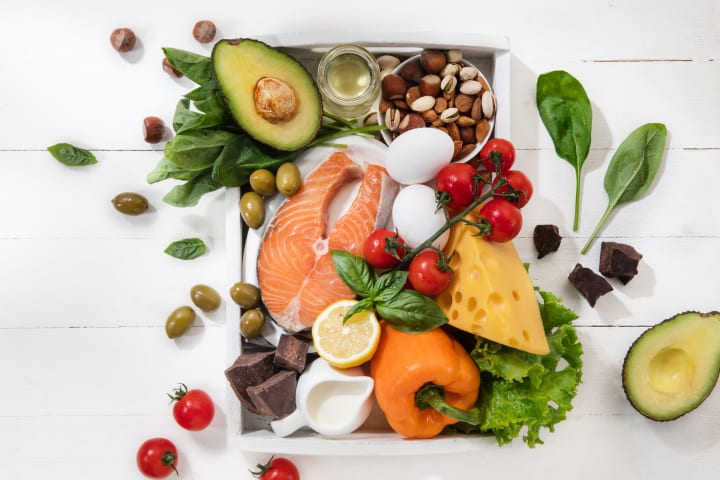
Losing weight can be difficult for many people, especially if they have tried several diets and exercise programs with little success. However, losing weight involves more than just calculating calories or sticking to a rigid diet. It is also about adopting healthy behaviors that will help you reach and sustain your goals in the long run. Here are some of the best healthy habits to help you lose weight and enhance your overall health and well-being.
1. Strive for a nutritional balance

Eating a balanced diet that contains all of the nutrients you require for good health is one of the most important weight reduction activities. This includes eating meals abundant in protein, fiber, healthy fats, vitamins, minerals, and antioxidants while avoiding foods high in sugar, processed carbohydrates, saturated fats, and sodium. A nutritional balance will help you feel fuller for longer periods of time, enhance your metabolism, control your blood sugar levels, and minimize cravings and overeating.
• Lean meats, chicken, fish, eggs, tofu, and legumes are examples of healthful foods that can help you lose weight.
• Fiber comes from whole grains, fruits, vegetables, nuts, and seeds. • Healthy fats come from avocado, olive oil, nuts, seeds, and fatty fish.
• Antioxidant-rich foods include berries, citrus fruits, leafy greens, broccoli, and tomatoes.
• Calcium-rich foods include dairy products, leafy greens, nuts, seeds, and beans.
• Bananas, potatoes, spinach, and beans are high in potassium.
• Vitamin D2 is found in eggs, dairy products, mushrooms, and fortified cereals.
2.Control your hunger.

Listening to your body's hunger and satiety signals is another important weight loss activity. Many people eat more than they need because they are distracted by environmental cues such as the time of day, plate size, or food availability. Eating thoughtfully, on the other hand, can help you listen in to your internal cues and eat only when you are truly hungry, stopping when you are pleasantly full.
Here are some ways to help you manage your appetite:
• Stay hydrated by drinking lots of water throughout the day and before meals to avoid confusing thirst for hunger.
• Eat slowly and thoroughly to allow your brain time to register that you are eating and convey fullness signals.
• Control your quantities and avoid overeating by using smaller dishes and bowls.• Wait at least 20 minutes before reaching for seconds or dessert to check if you are still hungry or just want more food out of habit, and avoid distractions such as TV, phone, or internet while eating.
3. Do not pass judgment on foods
Many people who are trying to reduce weight categorize things as good or bad, healthy or unhealthy. This can, however, lead to a bad relationship with food and emotions of guilt, shame, or deprivation when consuming specific foods. Rather than critiquing foods, try to have a more adaptable and pleasant attitude toward food, and enjoy all foods in moderation.
• Don't eliminate any foods from your diet unless you have a medical cause to do so. Allow yourself to indulge in occasional treats without feeling guilty or binging on them.
• Food should never be used as a reward or punishment. Find alternative ways to celebrate your accomplishments or cope with stress, such as spending time with friends, reading a book, or going for a stroll.
• Do not compare your dietary choices to those of others. Instead, concentrate on what works best for you and your body while keeping in mind that everyone has different tastes, needs, and goals.
4. Plan your meals ahead of time
Meal planning ahead of time can help you save time, money, and calories. It can also assist you in avoiding impulse purchases, missing meals, or ordering takeout when you don't have anything ready to eat. You can guarantee that you have a variety of healthful foods on hand and that you satisfy your daily calorie and nutritional demands by planning your meals.
Here are some tips to help you plan your meals:
• Create a weekly menu depending on your tastes, money, and schedule.
• Make a grocery list based on your menu and stick to it when you go shopping.
• Make some dishes or ingredients ahead of time and save them in the refrigerator or freezer for later use.
• Make new recipes or snacks out of leftovers.
5. Engage in frequent physical activity.

Exercise is not only good for weight loss, but it is also good for your physical and emotional wellbeing. It can help you lose weight, gain muscle, increase your cardiovascular fitness, strengthen your bones and joints, boost your mood, and lower your risk of chronic diseases. Adults should have at least 150 minutes of moderate-intensity aerobic activity per week or 75 minutes of vigorous-intensity aerobic activity per week, plus muscle-strengthening activities on two or more days per week.
Some exercises that can help you lose weight include:
• Aerobic activity: walking, jogging, cycling, swimming, or dancing; muscle-strengthening activity: lifting weights, doing push-ups, squats, lunges, or planks
• Stretching, yoga, Pilates, Tai Chi, or other forms of flexibility and balance training
Try red light therapy as an added bonus.

Red light therapy is a new treatment that stimulates biological activities in the body by using low-level red or near-infrared light. It has been demonstrated to provide a variety of health advantages, including skin health improvement, wound healing, pain relief, and inflammation reduction. But did you know it can also aid with weight loss?
Several studies have revealed that red light treatment can help people lose weight by increasing fat cell breakdown (lipolysis), improving blood flow (angiogenesis), and raising metabolism (thermogenesis). It can also increase oxygen delivery (hemoglobin), energy synthesis (ATP), and muscle fiber development (hypertrophy) in the muscles.
Red light therapy is non-invasive, painless, and safe. You can use it at home with a device like a red light treatment belt that wraps around your waist or other fat-loss areas. Simply put it on for 10 to 20 minutes every day while relaxing or doing other things. After a few weeks of constant use, you may begin to see effects.
Conclusion
Incorporating these top five healthy behaviors into your weight loss journey can have a significant impact on your overall success and well-being. Finding a nutritious balance, managing your appetite, avoiding food judgment, planning meals ahead of time, and getting regular exercise will help you achieve long-term weight loss.
Remember that losing weight is about more than just numbers on a scale or fitting into a certain dress size. It's about developing a positive connection with food, prioritizing self-care, and feeding your body in a way that feels good to you. Accept the road and rejoice in each small success along the way.
We'd love to hear your thoughts and experiences as you begin your weight-loss journey. Please leave your views, questions, and success stories in the comments section below. We can inspire and support each other on the way to a healthier and happier life if we work together.
About the Creator
VitalCare
Share the story of audience every day, and provide relevant advice on hair growth, weight loss, skin care, etc. Your health matters to us!






Comments
There are no comments for this story
Be the first to respond and start the conversation.